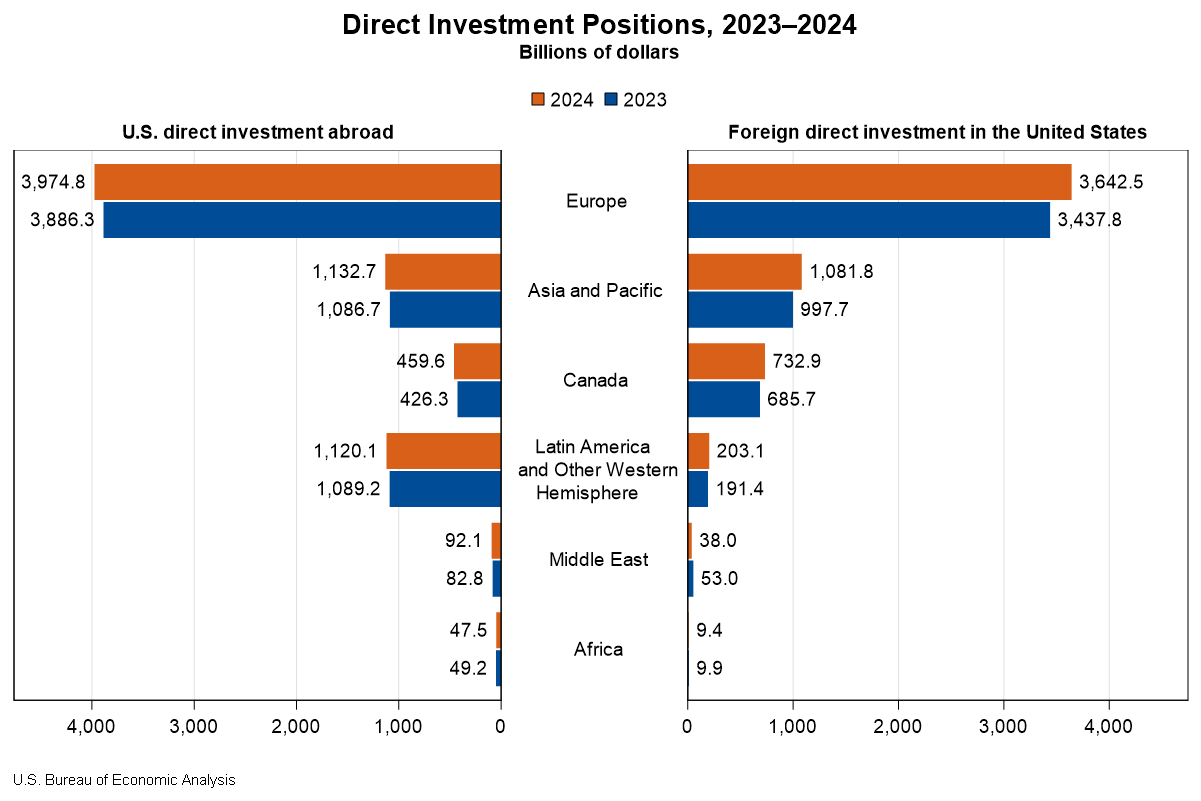Bureau of Economic Analysis
Direct Investment by Country and Industry, 2024
The U.S. direct investment abroad position, or cumulative level of investment, increased $206.3 billion to $6.83 trillion at the end of 2024, according to statistics released today by the U.S. Bureau of Economic Analysis. The increase was led by an $88.4 billion increase in the position in Europe, primarily in Luxembourg and Germany. By industry, manufacturing affiliates had the largest increase, led by manufacturing of computers and electronic products.
The foreign direct investment in the United States position increased $332.1 billion to $5.71 trillion at the end of 2024. The increase was led by a $204.7 billion increase in the position from Europe, which reflected a $52.9 billion increase from the United Kingdom and a $39.7 billion increase from Germany. By industry, affiliates in manufacturing increased the most.
Principal Federal Economic Indicators
Noteworthy
- 2025 News Release Schedule
- Innovation at BEA
- 2025 Annual Updates
- New! Services Trade Data for More Countries
- Data Tool: Trade in Value Added
- Distribution of State Personal Income
- Updated: RIMS II Regional Multipliers
- Arts and Culture
- Space Economy
- FDI Now in State BEARFACTS
- Quick Guide: Price Indexes
The Latest
Coming Soon: State Outdoor Recreation Statistics
BEA will release prototype statistics on Sept. 20 showing the role that outdoor recreation – pursuits like bicycling, RVing, and fishing – plays in each state’s economy. This will mark the first time state data are included in BEA’s outdoor recreation statistics.
An updated set of national outdoor recreation statistics will be released at the same time. Both the national and state data will cover 2012 through 2017.
BEA to Hold Sept. 10 Webinar on BE-140 Benchmark Survey of Insurance Services
BEA will conduct a webinar on Sept. 10 for those required to fill out the BE-140, a benchmark survey that collects information on insurance transactions between U.S. insurance companies and foreign persons.The one-hour webinar will start at 1 p.m. EDT and detail reporting requirements for the survey, which is due to the Bureau of Economic Analysis by Sept. 30.
July 2019 Trade Gap Is $54.0 Billion
The U.S. monthly international trade deficit decreased in July 2019, according to the U.S. Bureau of Economic Analysis and the U.S. Census Bureau. The deficit decreased from $55.5 billion in June (revised) to $54.0 billion in July, as exports increased and imports decreased.
U.S. International Trade in Goods and Services, July 2019
The U.S. monthly international trade deficit decreased in July 2019 according to the U.S. Bureau of Economic Analysis and the U.S. Census Bureau. The deficit decreased from $55.5 billion in June (revised) to $54.0 billion in July, as exports increased and imports decreased. The previously published June deficit was $55.2 billion. The goods deficit decreased $1.6 billion in July to $73.7 billion. The services surplus decreased $0.1 billion in…
BEA Updates Regional Economic Impact Tool
The U.S. Bureau of Economic Analysis has updated its regional economic modeling system used by local planners, investors, and policymakers. This tool can help assess the potential economic effects of a new corporate headquarters, a highway project, or new regulations.
Real Consumer Spending Rises in July
Personal income increased 0.1 percent in July after increasing 0.5 percent in June. Wages and salaries, the largest component of personal income, increased 0.2 percent in July after increasing 0.5 percent in June.
Current-dollar disposable personal income (DPI), after-tax income, increased 0.3 percent in July after increasing 0.4 percent in June.
Personal Income and Outlays, July 2019
Personal income increased 0.1 percent in July after increasing 0.5 percent in June. Wages and salaries, the largest component of personal income, increased 0.2 percent in July after increasing 0.5 percent in June.
GDP Increases in Second Quarter
Real gross domestic product (GDP) increased 2.0 percent in the second quarter of 2019, according to the “second” estimate released by the Bureau of Economic Analysis. The growth rate was 0.1 percentage point lower than the “advance” estimate released in July. In the first quarter, real GDP rose 3.1 percent.
Gross Domestic Product, Second Quarter 2019 (Second Estimate); Corporate Profits, Second Quarter 2019 (Preliminary Estimate)
Real gross domestic product (GDP) increased 2.0 percent in the second quarter of 2019, according to the “second” estimate released by the Bureau of Economic Analysis. The growth rate was 0.1 percentage point lower than the “advance” estimate released in July. In the first quarter, real GDP rose 3.1 percent.
American Samoa GDP Increases in 2018
The estimates of GDP for American Samoa show that real GDP—GDP adjusted to remove price changes—increased 2.2 percent in 2018 after decreasing 5.8 percent in 2017 (see Table 1.3). For comparison, real GDP for the United States (excluding the territories) increased 2.9 percent in 2018 after increasing 2.4 percent in 2017.




